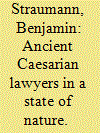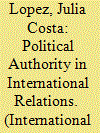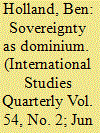| Srl | Item |
| 1 |
ID:
069782


|
|
|
| 2 |
ID:
172842


|
|
|
|
|
| Summary/Abstract |
In international relations, accounts of medieval political authority are divided between those who see a heteronomous patchwork of overlapping authorities and those who claim that the era of the state started in the twelfth century. How can we overcome this divide? I argue that IR's current difficulties in grasping the nature of medieval political authority stem from shortcomings in how the notion of political authority itself has been conceptualized. Thus, rather than starting from a substantive definition of political authority, I focus on contestation over the categorization and authorization of rule, that is, on how authority is produced in historically specific ways as a result of contemporary contestation over what political authority is, who is authorized, and how rulers stand in relation to one another. This reorientation allows us to appreciate how medieval political authority emerged from the competition between four sets of ordering categories: iurisdictio, potestas, lord/vassal, and magistrate. Each one of these four categories understood authority, rulers, and the relation between rulers in different ways. The problem with existing accounts of medieval authority is that they attempt to find the single ordering principle of medieval international relations. In doing so, they not only fail to capture the features of the time but also reinforce a particular approach to political authority that is unhelpful for understanding medieval and modern politics alike.
|
|
|
|
|
|
|
|
|
|
|
|
|
|
|
|
| 3 |
ID:
096692


|
|
|
|
|
| Publication |
2010.
|
| Summary/Abstract |
The constructivist authors John Gerard Ruggie, Friedrich Kratochwil, and Nicholas Onuf have each independently pressed the case that the concept of state sovereignty owes its genesis to the rediscovery of the Roman law of private property in the Renaissance. This article supports this conclusion, but argues that it was the notion of representation that Roman property law bequeathed which was of such significance. It makes this argument through analyses of the writings of Hobbes (on the temporally permanent state), Montesquieu (on the territorially bounded state), and Sieyès (on the nation-state). It thus provides a fresh account of the rise of the nation-state within the framework of a powerful series of analyses of sovereignty that have been posited by scholars in the discipline of International Relations.
|
|
|
|
|
|
|
|
|
|
|
|
|
|
|
|